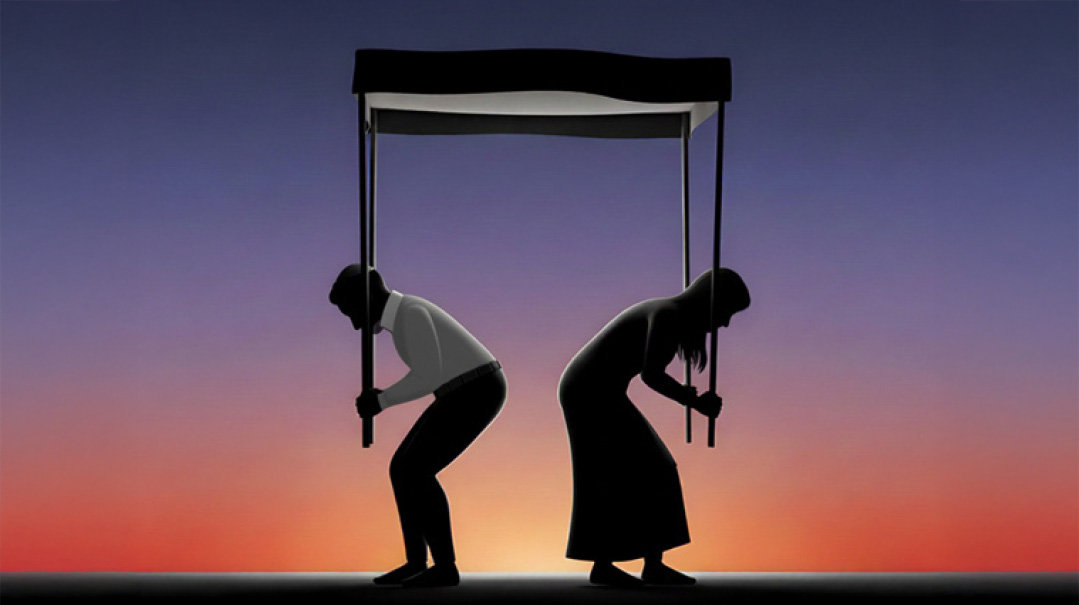A Fuzzy Line

Are we deluding ourselves? Because atop our daily servings of news, we’re getting a not-so-subtle sprinkling of culture

A few years ago, I noticed that one of the news sources I perused for a reliably rightist view on current events had begun posting stories about celebrities — sports, movies, even fashion. Then the site started posting weekly reviews of a popular TV series. Soon it became a bizarre mix of intelligent political commentary and lowbrow lifestyle content. It took some time to find my backbone, but eventually (and with a measure of regret), I decided the site was no longer within my comfort zone.
I don’t think I’m the only Mishpacha reader who tries to keep a firm demarcation between news and entertainment. I see a certain value and purpose in staying aware of news and politics. I see risk and debasement in following secular culture. There have always been times when the two overlapped — but as a general rule, it was possible to stay on top of what we call “the news” without descending into popular culture.
During the most recent election cycle, I found myself pulled once again to that site I had previously put on my “inappropriate list.” Not for the movie reviews or celebrity updates, but for its smart and uber-relevant takes on news and politics.
The smart takes were still there. But something troubling had happened. During my hiatus, the lowbrow tone that dominated the lifestyle content had crept into the news commentary. Even the smart, news-focused analysis was now peppered with profanity, coarse humor, and references to celebrities.
How could it be any different? Our most recent election campaign demonstrated just how dramatically and absolutely American politics has been subsumed by popular culture. The candidates’ teams may have drafted official policy platforms, but in their public addresses and campaign messaging, it was clear their primary messages weren’t really about policy. At heart each campaign revolved around what Barack Obama likes to call “who we are as a people.”
Conservative commentator Ben Shapiro once explained that for all that his followers care about conservative ideas and ideals, people are shaped primarily by the surrounding “sea of culture.” The movies they consume, the sports they follow, the recipe trends that show up on their dinner tables — these define the parameters of the average citizen’s reality in a more immediate and encompassing way than their political or even religious principles.
So if you’re a politician aiming to capture the allegiance and votes of the electorate, you’ll try to meet them where they’re at. And you will therefore appeal to aspects of their lives beyond politics.
You’ll spice your stump speeches with quotes from their favorite movies or TV series. If there’s a popular song that’s captured the airwaves and the hearts of young listeners, you’ll try to create some mental associations between the tune and your candidacy. At rallies and conventions, in commercials and endorsements, you’ll choose — as your most effective political advocates — not those with government positions or political know-how, but a line of celebrities from the worlds of entertainment, sports, and music.
This election season, the attempt to “meet the people where they’re at” also extended to the candidates’ choice of media channels. In the information landscape of 2024, vast swaths of the American public have learned to distrust and ignore classic media sources. Instead, they turn to lifestyle gurus and self-curated channels — hybrids of entertainment and media — to get their election takes. As the presidential candidates sought to connect with typical Americans, they found pathways to voters (or failed to find them, with dire results) in the podcast and digital media spheres.
Most members of this new campaign cast are not overtly political; some wouldn’t know a policy paper if it hit them in the face. They’re all about music, or personal finance, or golf, or prize fighting. And they just might have held the keys to the presidential election.
It’s never smart to make assumptions about a diverse group, but it’s probably safe to say that most Mishpacha readers are cautious and intentional about their access to secular media. We’re very selective about the reading material we allow past our doorsteps. We pay hard-earned money to filter our devices. We monitor and restrict our children’s exposure to screens. In short, we think we’re insulated — and in some ways we are.
But lots of us listen to podcasts, or pass along clips we receive on our filtered phones or computers, or follow certain pundits. Many of us feel a certain thrill when a kosher site or source posts a great gotcha quote from a decidedly nonkosher source. It’s just news, we tell ourselves. It’s normal and expected — positive and maybe even praiseworthy — to know what’s going on in the world. For sure in your own country.
Are we deluding ourselves? Because atop our daily servings of news, we’re getting a not-so-subtle sprinkling of culture. As we follow politics, we imbibe the celebrity worship that is so inimical to our values. With virtually every lap of election coverage these last few months, we were unwittingly immersed in casual profanity that has no place in our lexicon. And as we debated the crucial issues facing America, we waded into topics and terminology we’d never bring up at the family table.
I’d like to think there is a way to get our news and stay informed while remaining insular and pure. I’d like to hope that we can maintain a line between a working knowledge of the people, events, and issues playing out on the world stage — and a working knowledge of the lifestyle icons and mores playing out in its cultural arena. But that line seems to be getting ever fuzzier.
Our new normal has seen the transformation of the halls of power to a chaotic reality show — complete with checkered players, backstabbing intrigue, and high-stakes ego games. We don’t dare press the “off” button, because the plot twists of this show affect our grocery bills and gas prices, our religious rights, and the safety of our people. But we can’t deny, either, that there has to be some cost, some repercussion, to our continued exposure. Will we be the same people when this is all over?
(Originally featured in Mishpacha, Issue 1037)
Oops! We could not locate your form.







